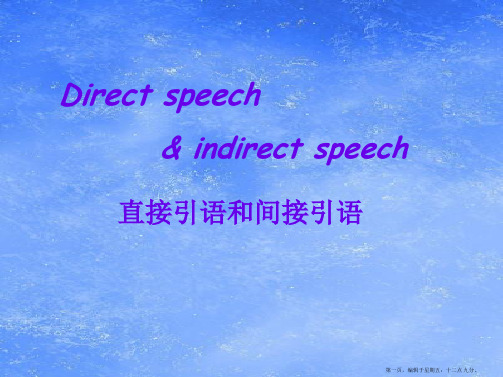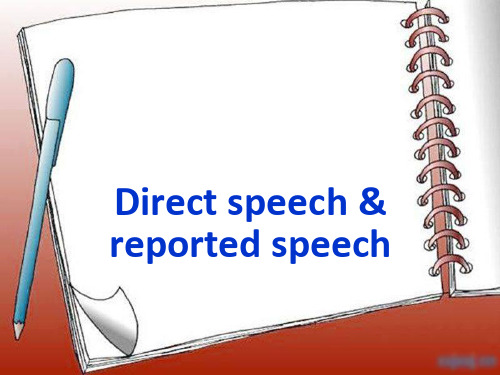高一英语《直接引语变间接引语》课件
合集下载
高中英语直接引语变间接引语(35张PPT)

➢句子结构的变化
1. 直接引语是陈述句,变为间接引语的方法 引导词为: that 语序: 不变
• He said, “I have been to the Great Wall. ” • He said that he had been to the Great Wall. • He said, “I'll give you an exam next Monday. ”
Direct Speech & Indirect speech
直接引语: 妈妈说:” 杰克是个好工人“. Direct speech:
Mother said :”Jack is a good worker.” 间接引语:妈妈说杰克是个好工人。 Indirect speech: Mother said that Jack is a good worker
小结:
➢ 在直接引语变为间接引语时需要注意的变化 1.注意时态的变化; 2.注意人称变化; 3.注意指示代词的变化; 4.注意时间状语的变化; 5.注意地点状语的变化; 6.注意个别趋向动词的变化。
将下列句子转换为间接引语:
1. He said,“ I have finished my homework last night”. He said that he had finished his homework the night before.
⑤直接引语如果是以“Let's”开头的祈使句,变为间 接引语时,通常用“suggest +动名词(或从句)” 如: He said, "Let's go to the movies."
→He suggested going to the movies. 或He suggested that they go to see the movies.
新人教版高中英语必修一直接引语和间接引语 ppt课件

1.She said to me, “I broke your CD player.” →She told me that she had broken my CD player. 2.He said to her, “I broke your CD player.” →He told her that he had broken her CD player.
He said to the boy,“ Come here, young man! ”
→He asked the boy to go there.
方向动词变化
2020/12/27
12
➢方向动词变化 come → go
bring → take
He said , “Don’t make so much noise, boys.” → He ordered the boys not to make so much noise.
5.直接引语为感叹句 变为由 that/ what/ how 引导的宾语从句 He said, “How happy I am!”
→ He said that he was very happy.
He said how happy he was.
He said, “What a fine day it is!”
→ She asked Tom if /whether he could help her.
2020/12/27
6
“Is this room yours or his?”
代词指向,二随宾
→ He asked me whether this room was mine or his.
He said to me , “I am learning English now.” 间接宾语 me
He said to the boy,“ Come here, young man! ”
→He asked the boy to go there.
方向动词变化
2020/12/27
12
➢方向动词变化 come → go
bring → take
He said , “Don’t make so much noise, boys.” → He ordered the boys not to make so much noise.
5.直接引语为感叹句 变为由 that/ what/ how 引导的宾语从句 He said, “How happy I am!”
→ He said that he was very happy.
He said how happy he was.
He said, “What a fine day it is!”
→ She asked Tom if /whether he could help her.
2020/12/27
6
“Is this room yours or his?”
代词指向,二随宾
→ He asked me whether this room was mine or his.
He said to me , “I am learning English now.” 间接宾语 me
高一英语《直接引语变间接引语》PPT课件

1
1
He said, “I arrived yesterday morning.” →He said he had arrived the morning before.
He said, “I saw a film the day before yesteray.” →He said that he had seen a film two days before. • 3 She said, “He left for Shanghai last week.” →She said that he had left for Shanghai the week before. 2
一.tense
• 1 The girl said, “I'm sorry for being late for class.” • →The girl said that she was sorry for being late for class. 2 He said to me, “I met your father.” • →He told me that he had met my father.
间接引语 indirect speech
一般现在时
一般过去时
现在进行时
现在完成时 一般过去时
过去进行时
过去完成时 过去完成时
一般将来时
过去完成时
过去将来时
过去完成时
直接引语中的助动词 shall should will
间接引语中的助动词 should Should(不变) would
would
may might can
He says, “I have finished my homework.” →He says that he has finished his homework.
1
He said, “I arrived yesterday morning.” →He said he had arrived the morning before.
He said, “I saw a film the day before yesteray.” →He said that he had seen a film two days before. • 3 She said, “He left for Shanghai last week.” →She said that he had left for Shanghai the week before. 2
一.tense
• 1 The girl said, “I'm sorry for being late for class.” • →The girl said that she was sorry for being late for class. 2 He said to me, “I met your father.” • →He told me that he had met my father.
间接引语 indirect speech
一般现在时
一般过去时
现在进行时
现在完成时 一般过去时
过去进行时
过去完成时 过去完成时
一般将来时
过去完成时
过去将来时
过去完成时
直接引语中的助动词 shall should will
间接引语中的助动词 should Should(不变) would
would
may might can
He says, “I have finished my homework.” →He says that he has finished his homework.
英语:直接引语变间接引语课件

2) 时态的变化
He says, ‘‘ I will do it tomorrow” He says that he will do it tomorrow.
如果主句的谓语动词是现在时, 直接引语变成间接引语时,从句的时态无需变化 如果主句的谓语动词是一般过去时, 直接引语变成间接引语时,从句的时态要做出相应下时态不变
1. 直接引语若表示的是客观事实或真理时, 变间接引语时时态不变. 2. 当引语中的时间状语表示过去某一具体时间时, 谓语动词时态不需改变. 3 如果直接引语要变为间接引语,转述是发生在 当天当地,那么直接引语中的 come、here、 tomorrow、this morning、today、yesterday等 不必改变.
第三 She said to me She , told me that 引号内的第三人 人称 “ They want to they wanted 称在变间引后去人 help him” 不用 称不变 help him 变
Practice:
1) He said,“ My brother failed in the exam.” He said ____brother had failed in the exam. his 2) He said to Mary,“ How is your mother now?” her he asked Mary how _____mother was then. 3)My teacher said, ‘‘ she is a good student. ’’ she My teacher said ____was a good student 4) He said to me,“ I’ve left her book in your he her my room” He told me that ___had left ___ book in ___ room.
直接引语变间接引语[课件]
![直接引语变间接引语[课件]](https://img.taocdn.com/s3/m/4d29a028453610661ed9f417.png)
• →He
I often him sing .
• Mother said to me, “Can you go shopping with me?”
• →Mother me
I go shopping with
.
• Tom asked, “Lucy, did you hand in your homework?”
1、直接引语如果是陈述句,变为间接引语时注意: ①不用引号,而用连接词that,但有时可省略。 ②人称作相应变化; ③主句里的动词如果是过去时,在间接引语中作相应改变:
如:He says,"I am from the USA.” →He says that he is from the USA. Mr Smith said to his girl friend,“ I haven’ t seen
→Lily asked Miss Green if it was made in China. 3、直接引语如果是特殊疑问句,变为间接引语时,需用疑
问词引导, 词序是:连词+主语+谓语。 Lucy said to me, “How can I help?” →Lucy asked me how she could help. 4、直接引语如是祈使句,变间接引语时,须变为动词不定 式,并在动词不定式前用tell, ask, order. He said to the boy,“ Come here,young man! ” →He asked the boy to go there.
• 1.She said to me, “I broke your CD player.” • →She told me that she had broken my CD
直接引语变间接引语(完整)PPT课件

CHENLI
17
二、间接叙述转换为直接叙述
(1)改标点,改逗号为冒号,添加引号。 (2)改人称如果转述内容中是第三人称“他 (她)”或“他(她)们”,应改为“我”或 我(们)”;如果在转换时遇到一个句子中有两个 第一人称“我”时,应改后面的一个“我”为第二 人称“你”。
CHENLI
18
例:姐姐说,她明天送给我一件生日礼物。 改为:姐姐说:“我明天送给你一件生日礼物。
9、老师对王小宁说:“我有事,你组 织同学们继续完成制作。”
10、王明再也忍不住了,抢着对老班长 说:“我帮你一起找,我找得见。”
CHENLI
16
8、老师严厉地对小敏说,他必须把教室打扫干净。
9、老师对王小宁说,他有事,王小宁组织同学们继续 完成制作。
10、李明再也忍不住了,抢着对老班长说,他我帮老班 长一起找,他找得见。
CHENLI
19
1、妈妈问小宁他昨天去了哪里,她找了 他一整天。
妈妈问小宁:“你昨天去了哪里?我找 了你一整天。”
2、小方说,不行,他的字写得不够好, 应该让小宇去参加比赛。
小方说:“不行,我的字写得不够好,
应该让小宇去参加比赛。”CHENLI
20
3、王兰告诉我,我作文比赛得了一等奖。
4、王刚对李明说,他的鞋破了,脚掌也 出血了,他实在走不动,让李明自己先 走吧!
CHENLI
21
3、王兰告诉我,我作文比赛得了一等奖。
王兰告诉我:“你作文比赛得了一等奖。”
4、王刚对李明说,他的鞋破了,脚掌也 出血了,他实在走不动,让李明自己先 走吧!
王刚对李明说:“我的鞋破了,脚掌也
出血了,我实在走不动,你自己先走吧!”
CHENLI
高中英语 直接引语和间接引语课件 新人教版必修1

第四页,编辑于星期五:十二点 九分。
2. “Have you been to the USA?〞 Jim asked
Tom.
Jim asked Tom whether/if he had been
to
He
the USA.
asked me,
“Do
you
play
chess?〞
He asked me if/whether I played chess.
traveling.”
第二页,编辑于星期五:十二点 九分。
He said , “I am a senior student.〞
He said that he was a senior student.
He said to me , “I am learning English now.〞
He said to/told me that he was learning
tomorrow
that those then
before
that day
(the) next day
第二十一页,编辑于星期五:十二点 九分。
直接引语
间接引语
the day after tomorrow yesterday last night the day before yesterday go bring here
He asked which school I was in.
第九页,编辑于星期五:十二点 九分。
6. He said,“Where have you been?〞 He asked where I had been.
7. He asked,“How are you getting along?〞
直接引语转间接引语ppt课件

→ The boy told us that he usually gets up at six every
morning.
1.The interviewer asked Detective Lu , ‘Why did you become a detective last year?’ The interviewer asked Detective Lu why he had become a detective the year before.
2.‘Where did you go two days ago?’ Lily asked Lucy. Lily asked Lucy where she had been two days before.
3.‘Will you go to see a film with me tomorrow?’ Sam asked Dick. Sam asked Dick whether/if he would go to see a film with him the following day/the next day.
直接引语转间接引语
1、时态变化:
2、人称变化:一主、二宾、三不变
3、时间状语和地点状语变化 4、指示代词、情态动词 5、 句子类化:
一般现在时 现在进行时 一般将来时
一般过去时 过去进行时 过去将来时
现在完成时
过去完成时
一般过去时
过去完成时
10.‘Light travels faster than sound.’ said the teacher. The teacher said that light travels faster than sound.
1. She said to Tom, ‘Can you help me?’ 2. She asked, ‘Is this book yours or his?’ 3. The teacher asked, ‘how did you repair it?’ 4. The teacher said to the students, ‘Don’t waste your time.’ 5. The mother said, ‘Tom, get up early, please.’ 6. ‘Will you go to the concert with me this evening?’ Mary asked me. 7. ‘What did you do yesterday?’ the old man asked my brother. 8. The engineer said, ‘I was at college in 1967.’ 9. ‘Where does your chemistry teacher live, Karen?’ the young man asked. 10. ‘Why were you late yesterday morning?’ His teacher asked.
morning.
1.The interviewer asked Detective Lu , ‘Why did you become a detective last year?’ The interviewer asked Detective Lu why he had become a detective the year before.
2.‘Where did you go two days ago?’ Lily asked Lucy. Lily asked Lucy where she had been two days before.
3.‘Will you go to see a film with me tomorrow?’ Sam asked Dick. Sam asked Dick whether/if he would go to see a film with him the following day/the next day.
直接引语转间接引语
1、时态变化:
2、人称变化:一主、二宾、三不变
3、时间状语和地点状语变化 4、指示代词、情态动词 5、 句子类化:
一般现在时 现在进行时 一般将来时
一般过去时 过去进行时 过去将来时
现在完成时
过去完成时
一般过去时
过去完成时
10.‘Light travels faster than sound.’ said the teacher. The teacher said that light travels faster than sound.
1. She said to Tom, ‘Can you help me?’ 2. She asked, ‘Is this book yours or his?’ 3. The teacher asked, ‘how did you repair it?’ 4. The teacher said to the students, ‘Don’t waste your time.’ 5. The mother said, ‘Tom, get up early, please.’ 6. ‘Will you go to the concert with me this evening?’ Mary asked me. 7. ‘What did you do yesterday?’ the old man asked my brother. 8. The engineer said, ‘I was at college in 1967.’ 9. ‘Where does your chemistry teacher live, Karen?’ the young man asked. 10. ‘Why were you late yesterday morning?’ His teacher asked.
高中英语 U1语法直接引语和间接引语课件 新人教必修1

He asked me
“What do you think of the film?” She asked her friend.
She asked her friend
which room
I
lived in
what
she
thought of
the film
.பைடு நூலகம்
.
3.直接引语是选择疑问句,变间接引语时, 引导词: whether/if …or 语序:陈述句语序 句尾标点:随主句标点
4. Where are you going for vacation, Tony? I asked Tony 5. Do you remember his birthday? She asked 6. “What can I do for you?” he asked me. He asked me 7. “Are you interested in English?” he said. He asked
He told us,“I want this blue one.”
He told us ____________________________.
She said to me, “You can’t do anything now.”
She told me ____________________________.
I was/am
his
was
1. Mary asked, “Could you help me cook dinner?” Mary asked me 2. He asked, “Why are you so late for school, Jimmy?” He asked Jimmy 3. Will you tell me the answer to this question? She asked
“What do you think of the film?” She asked her friend.
She asked her friend
which room
I
lived in
what
she
thought of
the film
.பைடு நூலகம்
.
3.直接引语是选择疑问句,变间接引语时, 引导词: whether/if …or 语序:陈述句语序 句尾标点:随主句标点
4. Where are you going for vacation, Tony? I asked Tony 5. Do you remember his birthday? She asked 6. “What can I do for you?” he asked me. He asked me 7. “Are you interested in English?” he said. He asked
He told us,“I want this blue one.”
He told us ____________________________.
She said to me, “You can’t do anything now.”
She told me ____________________________.
I was/am
his
was
1. Mary asked, “Could you help me cook dinner?” Mary asked me 2. He asked, “Why are you so late for school, Jimmy?” He asked Jimmy 3. Will you tell me the answer to this question? She asked
高中英语直接引语变间接引语(共31张PPT)

Direct speech & reported speech
Definition(定义)
• 原封不动地引用原话,把原 话放在引号内,叫直接引语 (Direct speech)
• 用自己的话加以转述,叫间 接引语(Indirect/reported speech),此时没有引号
I understand you.
She said that she would go shopping the next day.
• 规律: 当主句动词为现在时,间接引语中的动词时态保持不 变; 当主句动词为过去时,间接引语中的动词作相应的前 推
一般现在时 现在完成时 现在进行时 一般将来时 一般过去时
一般过去时 过去完成时 过去进行时 过去将来时 过去完成时
could, would, might, used to, had better等, 时态不再变。
She said to me, “You must hurry up.” → She told me I must hurry up.
5. 从句为过去完成时态、过去进行时态时
不变
Practice
1. “I’ve found my wallet,” he said to me. He _t_o_ld___ me he _h__a_d__ _fo_u_n_d__ __h_is___
homework that night.
“ I will go to college.”
What does he often
? say
He often says he will go to college.
“I am playing football.”
? What did he say
Definition(定义)
• 原封不动地引用原话,把原 话放在引号内,叫直接引语 (Direct speech)
• 用自己的话加以转述,叫间 接引语(Indirect/reported speech),此时没有引号
I understand you.
She said that she would go shopping the next day.
• 规律: 当主句动词为现在时,间接引语中的动词时态保持不 变; 当主句动词为过去时,间接引语中的动词作相应的前 推
一般现在时 现在完成时 现在进行时 一般将来时 一般过去时
一般过去时 过去完成时 过去进行时 过去将来时 过去完成时
could, would, might, used to, had better等, 时态不再变。
She said to me, “You must hurry up.” → She told me I must hurry up.
5. 从句为过去完成时态、过去进行时态时
不变
Practice
1. “I’ve found my wallet,” he said to me. He _t_o_ld___ me he _h__a_d__ _fo_u_n_d__ __h_is___
homework that night.
“ I will go to college.”
What does he often
? say
He often says he will go to college.
“I am playing football.”
? What did he say
直接引语变为间接引语ppt课件

直接引语为一般疑问句时,间接引语中用 whether或if引导;直接引语为特殊问句时,间 接引语中仍用原来的疑问词。
从使用情况来看,闭胸式的使用比较 广泛。 敞开式 盾构之 中有挤 压式盾 构、全 部敞开 式盾构 ,但在 近些年 的城市 地下工 程施工 中已很 少使用 ,在此 不再说 明。
For example:
For example: 1. "Open the door,please."She said.
She asked me to open the door.
2. It says,"No smoking here." It told us not to smoke there.
从使用情况来看,闭胸式的使用比较 广泛。 敞开式 盾构之 中有挤 压式盾 构、全 部敞开 式盾构 ,但在 近些年 的城市 地下工 程施工 中已很 少使用 ,在此 不再说 明。
时态的变化
当主句是过去时时,从句要得变为相应的过去时态, 变化规律如下:
一般现在时—— 一般过去时 一般过去时—— 过去完成时 一般将来时—— 过去将来时 现在进行时—— 过去进行时 现在完成时—— 过去完成时 过去完成时—— 过去完成时(时态不变) 过去进行时—— 过去进行时(时态不变)
从使用情ቤተ መጻሕፍቲ ባይዱ来看,闭胸式的使用比较 广泛。 敞开式 盾构之 中有挤 压式盾 构、全 部敞开 式盾构 ,但在 近些年 的城市 地下工 程施工 中已很 少使用 ,在此 不再说 明。
English teacher. 另外注意直接引语为复数,引述者主语为单数,间接引语主语相应变复
数。如: He said,“Are you interested in English?”→He asked me/us if I
从使用情况来看,闭胸式的使用比较 广泛。 敞开式 盾构之 中有挤 压式盾 构、全 部敞开 式盾构 ,但在 近些年 的城市 地下工 程施工 中已很 少使用 ,在此 不再说 明。
For example:
For example: 1. "Open the door,please."She said.
She asked me to open the door.
2. It says,"No smoking here." It told us not to smoke there.
从使用情况来看,闭胸式的使用比较 广泛。 敞开式 盾构之 中有挤 压式盾 构、全 部敞开 式盾构 ,但在 近些年 的城市 地下工 程施工 中已很 少使用 ,在此 不再说 明。
时态的变化
当主句是过去时时,从句要得变为相应的过去时态, 变化规律如下:
一般现在时—— 一般过去时 一般过去时—— 过去完成时 一般将来时—— 过去将来时 现在进行时—— 过去进行时 现在完成时—— 过去完成时 过去完成时—— 过去完成时(时态不变) 过去进行时—— 过去进行时(时态不变)
从使用情ቤተ መጻሕፍቲ ባይዱ来看,闭胸式的使用比较 广泛。 敞开式 盾构之 中有挤 压式盾 构、全 部敞开 式盾构 ,但在 近些年 的城市 地下工 程施工 中已很 少使用 ,在此 不再说 明。
English teacher. 另外注意直接引语为复数,引述者主语为单数,间接引语主语相应变复
数。如: He said,“Are you interested in English?”→He asked me/us if I
《直接引语间接引语》课件

03
间接引语转换为直接引语 的技巧
动词的还原
总结词
在将间接引语转换为直接引语时,动词的还原是关键步骤之一。
详细描述
首先,我们需要确定原句中的主要动词,并保持其在直接引语中的时态和语态。如果原句中的动词是过去时态或 完成时态,需要在直接引语中相应地使用过去时态或完成时态。此外,如果原句中的动词是被动语态,需要将其 还原为主动语态。
详细描述
设计相应的练习题,让学生逆向操作 ,将间接引语转换为直接引语,进一 步巩固学生对两种引语转换的理解。
综合练习
总结词
提供包含多种情境的综合练习题,以 检验学生对直接引语和间接引语转换 的掌握程度。
详细描述
设计涵盖不同情境的综合练习题,包 括时态、语态和人称的转换,以及复 杂句型的处理等,以检验学生对直接 引语和间接引语转换的全面掌握程度 。
直接引语变间接引语 时,时态一般不变化 ,仍保持原有的时态 。
如果直接引语是一般 现在时,变为间接引 语时,时态不变。
如果直接引语中有明 确的过去时间状语, 变为间接引语时,时 态不变。
主谓一致的注意事项
01
直接引语变间接引语时,主谓一 致要遵循中文的习惯,即主语是 单数时谓语用单数,主语是复数 时谓语用复数。
VS
详细描述
在将间接引语转换为直接引语时,需要注 意连接词的使用。如果原句中使用了转折 、因果、条件等关系的连接词,需要在直 接引语中还原这些连接词,以保持句子的 逻辑关系。同时,还需要注意连接词的语 气和情感色彩,以保持直接引语的语境和 情感表达。
04
直接引语和间接引语的注 意事项
时态的注意事项
直接引语的作用
直接引语可以准确地表达 别人的原意,有助于读者 或听众更好地理解说话人 的意图。
- 1、下载文档前请自行甄别文档内容的完整性,平台不提供额外的编辑、内容补充、找答案等附加服务。
- 2、"仅部分预览"的文档,不可在线预览部分如存在完整性等问题,可反馈申请退款(可完整预览的文档不适用该条件!)。
- 3、如文档侵犯您的权益,请联系客服反馈,我们会尽快为您处理(人工客服工作时间:9:00-18:30)。
△(如果转述发生在当天、当地的事,引 语中的(come, here, today, this morning, yesterday,tomorrow)等不必 改变:
• Bob’s wife said, “Bob, you forgot your wallet this morning.”
• →Bob’s wife told Bob that he forgot his wallet this morning.
today.”
3).tonight --- that night 4).this week (month, etc) --- that week
(month, etc) 5).yesterday --- the day before
6).yestersay morning --- the morning before
直接引语变间接引语
1.时态变化
1).时态需要变化的是: 2).时态不需要变化的是:
1).时态需要变化:
①.一般现在时变一般过去时: The girl said, “I'm sorry for being
late for class.” →The girl said that she was sorry
• →Jack asked John where he was going when he met him in the street.
2.人称变化
一般遵循这句顺口溜 “一 随主,二随宾,第三人称 无变化”
1).“一随主”是指引号内的主语人称是第 一人称或被第一人称修饰,变间接引 语时,人称要变成引号外的主语人称。 如:
②.He saidter now?"
• →He asked Kate how her sister was then.
3).“第三人称不用变”是指引号内的主 语及宾语是第三人称或被第三人称修 饰,人称一般不需要变化。如:
①.His mother said to me, “He can't go to school.”
③.过去完成时:
• She said, “They had left when I arrived there.”
• →She said they had left when she arrived there.
④.过去进行时:
• Jack said, “John, where were you going when I met you in the street?”
7).the day before yesterday --- two days before
8).last week (month, etc) --- the week (month, etc) before
for being late for class.
②.一般过去时变过去完成时: He said to me, “I met your father.” →He told me that he had met my
father.
③.一般将来时变过去将来时: She said, “He will go to see his
friend.” →She said he would go to see his
friend.
④.现在完成时变过去完成时:
She said. “I have lost a pen.”
→She said that she had lost a pen ⑤.现在进行时变过去进行时:
She said to me, “I’m studying Japanese these days.”
①.They said, “We will go there by bus.”
• →They said they would go there by bus.
②.She said “My sister wants to go with me.”
• →She said (that) her sister wanted to go with her.
4.时间状语变化
1).now --- then • He said, “I am very busy now.” • →He said he was very busy then. 2).today --- that day • Kitty said “I’ll call again after supper
2).“二随宾”是指引号内的主语及宾语是第二 人称或被第二人称修饰,变间接引语时,人 称要变成引号外的宾语人称。如果引号外没 有宾语,也可以用第一人称。如:
①.She said to me, “Are you interested in science?”
• →She asked me if I was interested in science.
3.指示代词变化
1).this --- that • He said, “I want this.” • →He said that he wanted that.
2).these --- those • He said, "These books are mine."
→He said that those books were his.
• →His mother told me that he couldn't go to school.
②.Mr Smith said, "Jack’s brother is a good worker."
• →Mr Smith said Jack’s brother was a good worker.
→She told me that she was studying Japanese those days.
2).时态不需要变化:
a. 直接引语中是: ①.客观真理: • “The earth goes around the sun.” said
the teacher.
• →The teacher said the earth goes around the sun.
